|
 Secure Site
Secure Site
|
 |
Archive for the 'wake up alarm clock' Category
 Wake Up Refreshed - Try the Most Gentle Alarm Clock with Acoustic Chime Although the occasional all-nighter is OK, people who regularly skimp on z’s can’t undo sleep deprivation’s detrimental effects by simply hitting the snooze button on weekends, says a new study in the journal Science of Translation Medicine.
Contrary to popular belief, the energy you feel after a Saturday morning sleep session is only short lived, according to the study. Chronic sleep loss has a cumulative effect on performance. Why? Lack of sleep raises levels of the stress hormone cortisol and affects a person’s ability to respond to stimuli, says Catherine Darley, ND, founder of Seattle’s Institute of Naturopathic Sleep Medicine. Sleep also plays a key role in mood regulation and overall physical and mental functioning.
Waking up in the morning should be as pleasant as falling asleep at night. The Zen Alarm Clock‘s gradual, gentle awakening is transformative.
 Wake up with gradual, beautiful acoustic chimes. The Zen Alarm Clock transforms your mornings and gets you started right, with a progressive awakening
Boulder, Colorado—an innovative company has taken one of life’s most unpleasant experiences (being startled awake by your alarm clock early Monday morning), and transformed it into something to actually look forward to. “The Zen Alarm Clock,” uses soothing acoustic chimes that awaken users gently and gradually, making waking up a real pleasure.
Rather than an artificial recorded sound played through a speaker, the Zen Clock features an alloy chime bar similar to a wind chime. When the clock’s alarm is triggered, its chime produces a long-resonating, beautiful acoustic tone reminiscent of a temple gong. Then, as the ring tone gradually fades away, the clock remains silent until it automatically strikes again three minutes later.
The frequency of the chime strikes gradually increase over ten-minutes, eventually striking every five seconds, so they are guaranteed to wake up even the heaviest sleeper. This gentle, ten-minute “progressive awakening” leaves users feeling less groggy, and even helps with dream recall.
 The Zen Alarm Clock transforms mornings, awakening you gradually with a series of gentle acoustic chimes Once you use a Zen Clock nothing else will do Now & Zen – The Zen Alarm Clock Headquarter Store
1638 Pearl Street
Boulder, CO 80302
(800) 779-6383
Posted in Chime Alarm Clocks, sleep, Sleep Habits, wake up alarm clock
 How Do We Find Balance in Life - Harunobu Suzuki, A girl Collecting Chrysanthemum Dem by the Stream The art of life balance requires creativity. If you push too hard you will miss its subtle rewards. Navigating easily through life requires a sense of curiosity and playfulness, like that of a child. This doesn’t excuse you from taking life seriously, simply that you release the illusion that you can control everything. By exerting control over everything, you may end up limiting yourself. The art of life balance requires dedicated time for having fun and observing the world around you. You may be surprised at what you find if you do.
 Meditation - A Stillness Practice Try a Stillness Practice Like Meditating:
Meditation is generally an inwardly oriented, personal practice, which individuals do by themselves. Meditation may involve invoking or cultivating a feeling or internal state, such as compassion, or attending to a specific focal point. The term can refer to the state itself, as well as to practices or techniques employed to cultivate the state. There are dozens of specific styles of meditation practice; the word meditation may carry different meanings in different contexts. Meditation has been practiced since antiquity as a component of numerous religious traditions. A 2007 study by the U.S. government found that nearly 9.4% of U.S. adults (over 20 million) had practiced meditation within the past 12 months, up from 7.6% (more than 15 million people) in 2002.
Although meditation can be done in almost any context, practitioners usually employ a quiet, tranquil space, a meditation cushion or bench, and some kind of timing device to time the meditation session. Ideally, the more these accoutrements can be integrated the better. Thus, it is conducive to a satisfying meditation practice to have a timer or clock that is tranquil and beautiful. Using a kitchen timer or beeper watch is less than ideal. And it was with these considerations in mind that we designed our digital Zen Alarm Clock and practice timer. This unique “Zen Clock” features a long-resonating acoustic chime that brings the meditation session to a gradual close, preserving the environment of stillness while also acting as an effective time signal. The Digital Zen Clock can be programmed to chime at the end of the meditation session or periodically throughout the session as a kind of sonic yantra. The beauty and functionality of the Zen Clock/Timer makes it a meditation tool that can actually help you “make time” for meditation in your life.
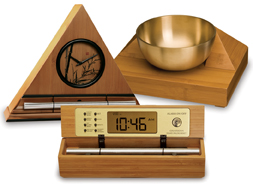 Timers for Meditation and Yoga - Progressive Acoustic Chimes
Now & Zen’s Meditation Timer Store
1638 Pearl Street
Boulder, CO 80302
(800) 779-6383
Posted in Bamboo Chime Clocks, wake up alarm clock, Well-being, Yoga Timer, Yoga Timers by Now & Zen
 Scientific Evidence for Beauty Sleep - Elegant Women. Courtesy of the Japan Ukiyo-e Museum Beauty sleep, it’s widely assumed, is one of those invented phenomena that parents use to ease their children’s passage to bedtime. After all, if sleeping had any real impact on beauty, bears, toads and frogs would be the handsomest creatures on the planet. But now a new study out of Sweden suggests there may be something to it after all.
In the study, published Tuesday on BMJ.com, John Axelsson of the Karolinska Institute looked at the effect that sleep, or its lack, had on the way other people perceived the attractiveness of the sleeper.
Axelsson’s interest in the subject was partly inspired by a question from his young daughter about whether it was the long nap that made Sleeping Beauty so lovely. And, partly, it was that he saw a gap in the scholarship. “The field of sleep research is full of studies showing the physiological and cognitive consequences of disturbed sleep,” he says, “while there is clear lack of how poor sleep affects our everyday social life.”
It’s estimated that about 40 million people suffer from chronic sleep disorders in the U.S. and a further 20 million have frequent problems sleeping. Even for good sleepers, with holiday and New Year’s celebrations oncoming, this is among the most slumber-deprived of seasons.
 How Can You Get Your Beauty Sleep? For the study, 23 participants, all between the prime partying ages of 18 to 31, were recruited. They were asked to sit for photographs in the afternoon, between 2 p.m. and 3 p.m. This time “coincides with the afternoon dip, or siesta time, a time where most people are sleepier,” says Axelsson. And unlike office workers, the study volunteers were not allowed to consume a mid-afternoon caffeinated beverage to keep them going.
Each photograph was identical — lit the same way, the same distance from the camera, with no makeup and natural hairstyles. The subjects were told to have a relaxed, neutral expression. They weren’t allowed to drink alcohol for the 48 hours prior to the experiment. The only difference among the volunteers was that some had had a full night’s sleep the night before, while others had been awake for 31 hours straight, after just five hours of sleep the previous night.
The photos were then shown to a group of 65 different people, who, knowing nothing about how tired the people in the photos were, rated their attractiveness. The observers rated the sleep-deprived as less healthy looking, less fetching and, obviously, more tired-looking.
Of course, anyone who’s ever pulled an all-nighter knows that it’s no formula for good looks — the next day, you’re saddled with puffy, bloodshot eyes, dark circles and a wan complexion — but now there’s a study to prove it. So if the old adage about getting your beauty sleep is true, what does that mean for watched pots never boiling, or crying over spilled milk? Probably nothing, but Axelsson is curious. “There are so many old ‘sayings’ or beliefs incorporated in our culture, but we do not know if they are true,” he says. “It is our scientists’ responsibility to evaluate the truth in them.”
Boulder, Colorado—an innovative company has taken one of life’s most unpleasant experiences (being startled awake by your alarm clock early Monday morning), and transformed it into something to actually look forward to. “The Zen Alarm Clock,” uses soothing acoustic chimes that awaken users gently and gradually, making waking up a real pleasure.
What makes this gentle awakening experience so exquisite is the sound of the natural acoustic chime, which has been tuned to produce the same tones as the tuning forks used by musical therapists. According to the product’s inventor, Steve McIntosh, “once you experience this way of being gradually awakened with beautiful acoustic tones, no other alarm clock will ever do.”
adapted from Time.com by Belinda Luscombe
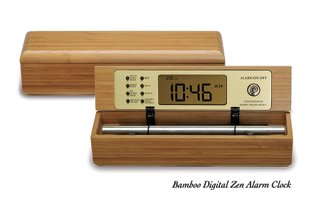 Choose a Gentle Alarm Clock to Awaken You Gently Now & Zen – The Peaceful Awakening Clock Store
1638 Pearl Street
Boulder, CO 80302
(800) 779-6383
Posted in Bamboo Chime Clocks, sleep, Sleep Habits, wake up alarm clock
 Dreams May Useful in Resetting Our Emotional Compass - Yoshitoshi Taiso Dreams may not be the secret window into the frustrated desires of the unconscious that Sigmund Freud first posited in 1899, but growing evidence suggests that dreams — and, more so, sleep — are powerfully connected to the processing of human emotions.
According to new research presented last week at the annual meeting of the Associated Professional Sleep Societies in Seattle, adequate sleep may underpin our ability to understand complex emotions properly in waking life. “Sleep essentially is resetting the magnetic north of your emotional compass,” says Matthew Walker, director of the Sleep and Neuroimaging Lab at the University of California, Berkeley.
REM sleep appears to not only improve our ability to identify positive emotions in others; it may also round out the sharp angles of our own emotional experiences. Walker suggests that one function of REM sleep — dreaming, in particular — is to allow the brain to sift through that day’s events, process any negative emotion attached to them, then strip it away from the memories. He likens the process to applying a “nocturnal soothing balm.” REM sleep, he says, “tries to ameliorate the sharp emotional chips and dents that life gives you along the way.
 Can Dreams Improve Our Emotional Life? adapted from Time.com, by Tiffany Sharples
Boulder, Colorado—an innovative company has taken one of life’s most unpleasant experiences (being startled awake by your alarm clock early Monday morning), and transformed it into something to actually look forward to. “The Zen Alarm Clock,” uses soothing acoustic chimes that awaken users gently and gradually, making waking up a real pleasure. Rather than an artificial recorded sound played through a speaker, the Zen Clock features an alloy chime bar similar to a wind chime. When the clock’s alarm is triggered, its chime produces a long-resonating, beautiful acoustic tone reminiscent of a temple gong. Then, as the ring tone gradually fades away, the clock remains silent until it automatically strikes again three minutes later. The frequency of the chime strikes gradually increase over ten-minutes, eventually striking every five seconds, so they are guaranteed to wake up even the heaviest sleeper. This gentle, ten-minute “progressive awakening” leaves users feeling less groggy, and even helps with dream recall.
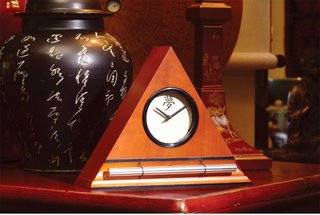 Gentle Chime Alarm Clocks for a Progressive Awakening Now & Zen – The Chime Alarm Clock Store
1638 Pearl Street
Boulder, CO 80302
(800) 779-6383
Posted in Bamboo Chime Clocks, sleep, Sleep Habits, wake up alarm clock, Well-being
Research published in the last two years shows that certain slow activities–like gentle yoga or gardening–can reduce your stress level and blood pressure and improve your body’s ability to regulate sugar. Past studies have shown that other habits like meditation can help reduce chronic pain and enhance mental clarity. The first step to finding “slowness”is to clear some room in your life–watch less TV or spend less time browsing at the mall. “Jettison the clutter that clogs up your schedule,” says Carl Honoré, author of In Praise of Slowness (HarperOne, 2004). “When you focus on the things that are important at work or at home you can enjoy those things more,”he says. You can also take a more relaxed approach to the things you already do and adopt new habits that require mindfulness. “It’s one thing to say you’re going to slow down, but a slow hobby helps you put those words into practice,” says Honoré. To get you started we’ve come up with seven ways to destress and reenergize.
 gardening is a great mindfulness practice that cultivates stillness of mind 1. Become a Gardener
Caring for flowering plants may help you relax and get grounded. In 2004, researchers at Japan’s Utsunomiya University found repotting plants lowered fatigue and promoted physiological relaxation in study participants, and that working with flowers seemed to have a stronger positive effect than working with nonflowering plants.
HEALTH BENEFITS Research shows that exposure to plants–and even just looking at them–can reduce blood pressure, increase concentration and productivity, and help you recover from illness, says Andy Kaufman, Ph.D., assistant professor of tropical plant and soil sciences at the University of Hawaii in Honolulu. He cites a classic 1984 study, published in Science, which showed that even the view of a green garden helped surgical patients recovering from gall bladder surgery. Among a group of 46 patients in a Pennsylvania hospital, the 23 who had rooms with windows facing greenery had shorter postoperative stays and needed fewer pain–relieving analgesics than the 23 whose windows faced a brick wall.
GETTING STARTED If you live in an apartment or don’t have much room to garden, invest in the EarthBox (earthbox.com), a self–watering container garden that comes with potting soil and fertilizer. “Even if you have a brown thumb, you can grow things [in it],”says David Ellis, American Horticulture Society spokesperson. You could also join a community garden; visit ahs.org, the American Horticulture Society’s website, for more info.
 yoga helps to slow us down 2. Practice Slow Yoga
Slow yoga emphasizes one drawn–out breath for each movement you make. Like tai chi, it uses many repetitive flowing moves. “When you practice slow yoga, you create more awareness between mind and body,”says Beth Shaw, founder of Yoga Fit Training Systems in Los Angeles. This creates a deep sense of stillness and helps develop patience and lower stress, she adds.
HEALTH BENEFITS Last year, researchers in Sweden and India showed that practicing yoga can reverse the negative effects of high blood pressure, obesity, and high blood sugar. The studies, published in the journal Diabetes Research and Clinical Practice, showed reduced waist circumference, blood pressure, blood sugar, and triglycerides (the chemical form of fat cells) and higher HDL (so–called good cholesterol) levels in a control group that practiced yoga versus a placebo group.
GETTING STARTED To find a Slow Yoga class near you visit yogafit.com or inquire at your local yoga studio. You might also consider restorative or yin yoga, two other gentle forms of the practice.
 Take a nap 3. Take a Nap
You snooze, you win, according to a Harvard study published last year in The Archives of Internal Medicine. Researchers revealed that people who regularly napped at least three times a week for an average of 30 minutes had a 37 percent lower risk of heart attack than those who didn’t nap. “It shows that napping is an important preventive strategy just like regular exercise, eating right, and not smoking,”says Sara C. Mednick, Ph.D., author of Take a Nap! Change Your Life (Workman, 2006).
HEALTH BENEFITS A daily nap also boosts serotonin, says Mednick, which may lead to improved memory and performance. Napping can even contribute to weight loss, according to a study in the American Journal of Physiology, Endocrinology, and Metabolism in 2007. That study looked at hormone levels in 41 men and women who were part of a seven–day sleep–deprivation experiment. Those allowed to nap for two hours following a night without any sleep showed a significant drop in cortisol, a hormone related to high levels of stress, and a complement of growth hormone, which helps regulate insulin and fat storage. Researchers concluded that a midafternoon nap improves alertness and performance and reverses the negative metabolic effects of sleep loss.
GETTING STARTED The best time to nap is between 1 p.m. and 3 p.m., but a 15– to 20–minute power nap at any time can help. Set your Zen Alarm Clock for 20 minutes. Close the office door and take a snooze, or find a quiet place where you feel safe. Nap on weekends, Mednick says. “Just don’t use the weekend to catch up on sleep lost in the week.”Check with your doctor about napping if you’re being treated for insomnia.
4. Start a Slow Hobby
 learning to paint Hobbies that require mindful, solitary activity–such as knitting, painting, sculpting, crocheting, or quilting–can act as a brake on your hectic pace.
HEALTH BENEFITS “Slow hobbies help you cultivate the lost art of concentration and being in the moment. They have a meditative quality to them,”says author Carl Honorè. “And that calming effect goes beyond the act itself. Maintaining that inner stillness enables you to negotiate the fast–moving waters of the rest of your day.”
GETTING STARTED Sixty–four percent of people who knit or crochet say they use these crafts to help them reduce stress and relax, according to the Craft Yarn Council of America. Visit craftyarncouncil.com for information. To learn about drawing, visit drawspace.com. Check with a local college or community center for other craft classes.
5. Eat Slowly
Eating too fast creates stress in the body, says nutritionist Marc David, author of The Slow Down Diet (Healing Arts Press, 2005). That causes a spike in cortisol and insulin, which in turn diminishes your ability to burn calories and makes you more likely to gain weight. Eating quickly also leads to overeating. “The brain demands more food if it doesn’t have time to register its needs for taste, aroma, and satisfaction,”says David.
HEALTH BENEFITS Taking time to eat creates a relaxation response, which means you’ll have fewer digestive complaints and your body will be able to take in the nutrients it needs. Plus “we make better food choices, and we know when to stop,”he adds.
GETTING STARTED To ease the pace, double the time you spend on your meals; for example, if you usually eat breakfast in five minutes, stretch it out to ten. “Focus on your food: Taste it, enjoy it, notice it, savor it,”says David. “Find relaxed time between bites by slowing down your internal conversation. Let go of any sense of urgency, and allow the moment to be sensual.”The cooking process can help you slow down too, says David. “Instead of microwaving something, make a soup from scratch.”
6. Do One Thing at a Time
A lot of us believe we get more done by multitasking. But research at the University of Michigan published in the Journal of Experimental Psychology in 2001, shows the opposite is true. “If you concentrate on one task at a time, you get more done faster and make fewer mistakes,” says David E. Meyer, director of the Brain, Cognition, and Action Laboratory at the University of Michigan.
HEALTH BENEFITS Taking on chores one at a time reduces chronic stress and protects your short–term memory, which comes under fire if the brain is overtaxed.
GETTING STARTED To curb outside distractions and focus better, set aside time when you can concentrate on one activity from start to finish. For example, check e–mail once an hour and turn off your instant messaging; let your phone messages go to voice mail and only check them occasionally throughout the day.
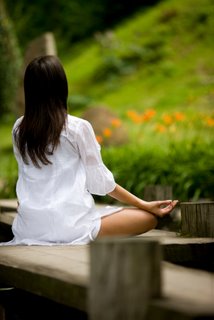 practice meditation in order to slow down 7. Meditate
“Meditation teaches us to focus,”says Steven Hartman, director of professional training at the Kripalu Health and Yoga Center (kripalu.org) in Stockbridge, Mass. “All day your mind is chattering. When you meditate, you can hear your own inner wisdom.”
HEALTH BENEFITS Studies have shown that practicing meditation also improves blood pressure, fortifies the immune system, and promotes a sense of well–being. “A daily meditation practice can bring body, breath, mind, and spirit into balance,”says Hartman.
GETTING STARTED Check out a program like Transcendental Meditation. (See tm.org.) Or begin at home: “Put an egg timer on and stay with your breath for just two and a half minutes,”says Hartman. “Keep your spine tall and straight and allow the breath to be natural.”If you’re seated on the floor, a cushion can raise your pelvis and bring your spine into a natural position. As you get comfortable with the practice, you can increase your time to 15 or 30 minutes a day.
adapted from Natural Health Magazine, by Chrystle Fiedler
One of the ultimate Zen like experiences is waking-up from a great slumber refreshed and energized. Your mind and body are harmoniously one, both alert and focused. Having a refreshed mind and body are two keys to a natural and Zen lifestyle. Waking up in the morning should not be a loud and abrupt awakening, but rather it should be a peaceful positive experience. The right natural alarm clock can transition your deep and tranquil sleep into a serene start to consciousness. Imagine a long-resonating Tibetan bell-like chime waking you up to a beautiful morning experience.
The right alarm clock can be the most beneficial investment for you. With our Now & Zen natural alarm clock you are awakened more gradually and thus more naturally. Now & Zen is focused on creating a naturalistic lifestyle, and our clocks are an example of our philosophy.
 Zen Meditation Timers with Soothing Chime Now & Zen – Soothing Chime Alarm Clock & Timer Store
1638 Pearl Street
Boulder, CO 80302
(800) 779-6383
Posted in Chime Alarm Clocks, intention, Meditation Timers, Meditation Tools, mindfulness practice, Natural Awakening, Now & Zen Alarm Clocks, sleep, Sleep Habits, wake up alarm clock, Well-being, yoga, Yoga Timer, Yoga Timers by Now & Zen, Zen Alarm Clock, Zen Timers
 winter hibernation In the depths of winter, do you find yourself wanting to sleep more, eat more and curl up by the fire? We often behave as if seasonal changes are irrelevant to a modern lifestyle. After all, in many ways, civilization is all about overcoming nature. But our bodies are evolutionarily old and remember how weather once dictated behavior. In winter, we hunkered around a fire, repairing tools and telling tales that wove our culture. We packed our bodies close and slept long.
Now we act as if it’s always summer, demanding consistently high productivity at work and at home. But our bodies require cycles of activity and rest—daily, annually. When days are long, our metabolisms and energy levels amp up. In winter, we produce hormones that make us sleepy, giving us time to restore body, mind and soul.
And there’s nothing wrong with that cycle—except that we work against it, forcing ourselves to operate at summer levels even in winter. No wonder so many people feel depressed at this time of year!
How SAD is that?
You’ve probably heard of Seasonal Affective Disorder, or SAD. You might even suffer from it—as many as half a million U.S. citizens do, according to the American Academy of Family Physicians. The fact that most clinicians address the issue via technology (daily exposure to high-intensity electric light) and/or medication provides an interesting perspective on our time. But some have noted that SAD’s symptoms have more in common with hibernation than with clinical depression.
Could SAD be a result of modern living’s demand to move at top speed all day, every day—and mostly indoors, disconnected from the sun’s cycles? Could we give in to a bit of hibernation?
 Time for Winter's Nap
Oh, to hibernate!
Hibernation is a survival strategy some animals use to get through foodless winters. Though humans don’t hibernate, some cultures have come close.
In 1900, the British Medical Association published a description of winters among Russian peasants. For centuries, they survived scant winter food by engaging in lotska—sleeping the whole season away. “At the first fall of snow the whole family gathers round the stove, lies down, ceases to wrestle with the problems of human existence and quietly goes to sleep.”
The peasants woke daily to eat some bread and drink some water and then dropped off again, taking turns keeping the fire going. After six months, “the family wakes up, shakes itself, goes out to see if the grass is growing, and by-and-by sets to work at summer tasks,” the article states.
In a 2007 New York Times editorial, historian Graham Robb similarly described rural 19th-century France:
Economists and bureaucrats who ventured out into the countryside after the Revolution were horrified to find that the work force disappeared between fall and spring…Villages and even small towns were silent, with barely a column of smoke to reveal a human presence. As soon as the weather turned cold, people all over France shut themselves away and practiced the forgotten art of doing nothing at all for months on end.
 slowing down
Dreaming of a better world
What if we indulged our inclination to slow down in winter? We’d sleep more and demand less from ourselves. We’d be more inward and reflective. I once met an artist who had mastered this. Perusing her work, I asked how she stayed creative as a painter, writer, weaver and sculptor. Her answer:
She changes media each season. In summer she’s out on her deck chiseling a sculpture. In fall, she is reflective and poetic. In winter, she works with warm fiber at her loom. And as spring beckons her outdoors, she sets up her easel in the meadow. Should our lives be any less a work of seasonal art?
One of the ultimate Zen like experiences is waking-up from a great slumber refreshed and energized. Your mind and body are harmoniously one, both alert and focused. Having a refreshed mind and body are two keys to a natural and Zen lifestyle. Waking up in the morning should not be a loud and abrupt awakening, but rather it should be a peaceful positive experience. The right natural alarm clock can transition your deep and tranquil sleep into a serene start to consciousness. Imagine a long-resonating Tibetan bell-like chime waking you up to a beautiful morning experience.
The right alarm clock can be the most beneficial investment for you. With our Now & Zen natural alarm clock you are awakened more gradually and thus more naturally. Now & Zen is focused on creating a naturalistic lifestyle, and our clocks are an example of our philosophy.
Adapted from Natural Home Magazine, January/February 2009 by Carol Veniola
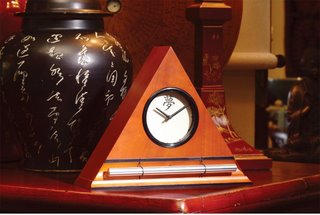 Zen Alarm Clock Now & Zen – Natural Chime Alarm Clock Store
1638 Pearl Street
Boulder, CO 80302
(800) 779-6383
Posted in Japanese Inspired Zen Clocks, Natural Awakening, Now & Zen Alarm Clocks, sleep, Sleep Habits, wake up alarm clock, Well-being
 meditating on a rock At Harvard Medical School’s Mind-Body Medical Institute, Dr. Herbert Benson and colleagues teach a technique they call the Relaxation Response, which is a demystified system of meditation, modeled directly on Transcendental Meditation (TM), a type of yogic mantra meditation. Numerous studies have shown that when you quiet the mind with these techniques, a variety beneficial physiological responses—including reduced heart rate, breathing rate, blood pressure, and levels of stress hormones—result, benefiting conditions from migraines to high blood pressure to infertility.
adapted from Yoga Journal, Yoga Therapy and the Mind-Body Connection, Part 1 by Timothy McCall, M.D.
Use our unique “Zen Clock” which functions as a Yoga & Meditation Timer. It features a long-resonating acoustic chime that brings your meditation or yoga session to a gradual close, preserving the environment of stillness while also acting as an effective time signal. Our Yoga Timer & Clock can be programmed to chime at the end of the meditation or yoga session or periodically throughout the session as a kind of sonic yantra. The beauty and functionality of the Zen Clock/Timer makes it a meditation tool that can actually help you “make time” for meditation in your life. Bring yourself back to balance.
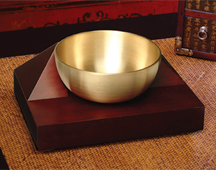 Singing Bowl Meditation Timer from Now & Zen, Inc. Now & Zen’s Singing Bowl Meditation Timer Store
1638 Pearl Street
Boulder, CO 80302
(800) 779-6383
Posted in intention, wake up alarm clock, Well-being, yoga, Zen Alarm Clock
 Five tips to fall asleep faster Having trouble falling asleep? Try these tried and true methods to help you fall asleep faster.
Take a walk. In Chinese medicine, insomnia caused by your brain’s inability to shut off the day’s stress is called “disturbed shen qi,” or a disturbed mental spirit. Releasing daytime stress before bedtime by taking a brisk walk or a warm bath is often more effective than taking a sedative.
Turn down the heat. Most people sleep more soundly in a cool room. A 2004 University of South Australia study found that the body needs to drop its core temperature for sleep to initiate normally.
Pump up the serotonin. Serotonin is a natural hormone associated with inducing sleep. Deficiencies in tryptophan, vitamin B6, niacin, magnesium or other nutrients can inhibit the hormone’s functioning. The best way to maintain proper nutrient levels is to eat a balanced diet. A daily multivitamin may help supplement dietary gaps. If you suspect a severe serotonin deficiency, consult your medical health professional.
Take charge with the 20-minute rule: If you lie sleepless for more than 20 minutes, get up and do a task. Get your mind out of the circular problem of being kept awake by the inability to fall asleep. Read, iron that pile of clothes or write in your journal.
Balance your blood sugar: If you’re not sleeping well, ask your doctor about testing your blood sugar levels. People suffering from hypoglycemia can experience blood sugar fluctuations at night. A drop in blood sugar signals the body to produce hormones and neurotransmitters that stimulate sugar release, which may wake you up. If you are hypoglycemic, ask your health care provider whether nutritional measures are appropriate for you.
One of the ultimate Zen like experiences is waking-up from a great slumber refreshed and energized. Your mind and body are harmoniously one, both alert and focused. Having a refreshed mind and body are two keys to a natural and Zen lifestyle. Waking up in the morning should not be a loud and abrupt awakening, but rather it should be a peaceful positive experience. The right natural alarm clock can transition your deep and tranquil sleep into a serene start to consciousness. Imagine a long-resonating Tibetan bell-like chime waking you up to a beautiful morning experience.
The right alarm clock can be the most beneficial investment for you. With our Now & Zen natural alarm clock you are awakened more gradually and thus more naturally. Now & Zen is focused on creating a naturalistic lifestyle, and our clocks are an example of our philosophy.
adapted from Natural Home, November/December 2010
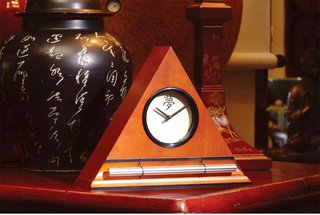 Gentle Wake Up Alarm Clocks with Chimes Now & Zen – The Natural Chime Alarm Clock Store
1638 Pearl Street
Boulder, CO 80302
(800) 779-6383
Posted in Insomnia, Natural Awakening, Now & Zen Alarm Clocks, sleep, Sleep Habits, wake up alarm clock, Well-being
 How to have more energy in the morning It’s often hard to find the inspiration to get out of your nice, comfortable bed when you’re still so tired. But according to Kundalini yoga, a built-in supply of energy lies dormant at the root of the spine, like a bulb that rests underground, waiting for a cue to bloom. By accessing this vitality, you’ll have the charge you need to fire up your day — without having to resort to a double latte.
“When you awaken your Kundalini energy and get it flowing up your spine,” says Maya Fiennes, a London yoga teacher and star of the DVD “Kundalini Yoga to Detox and Destress,” “you become alert and uplifted instead of sluggish and stressed.” We worked with Fiennes to develop this series of simple moves that stretch and strengthen the spine, increase vitality, reduce tension, release impurities, and improve focus — everything you need to face what lies ahead.
Camel Ride (pictured)
Targets
The lower spine.
What It Does
Releases lower-back tension, opens the hips, stimulates the digestive and immune systems, and promotes mental focus. “When you flex the spine,” says Fiennes, “you flex the mind.”
How to Do It
Sit cross-legged on the floor with your hands resting on your ankles. Bring your ribs and chest forward, gently arching your back, as you inhale. Then move the rib cage backward and round your lower spine as you exhale. Keep your neck relaxed and your chin parallel to the ground. Continue doing this exercise in unison with your breath for about two minutes, set your zen timer to repeat every 2 minutes and repeat six times.
Sufi’s Circle
Targets
The middle spine.
What It Does
Creates more space in the torso and encourages the lungs to expand; further stimulates digestion; soothes the nervous system. “The spiral is a familiar pattern in nature,” says Fiennes. “It’s very calming to move this way.”
How to Do It
Inhale and rotate your ribs forward and to the right, then exhale as you continue back and to the left, drawing a big circle with your chin and rib cage. Your spine will arch slightly and then round throughout the exercise. Rest your hands on your knees, using them for leverage. After two minutes, reverse and repeat for two more minutes.
Spinal Twist
Targets
The upper spine.
What It Does
Promotes detoxification; stimulates the lymphatic system; encourages energy to flow throughout the spine.
How to Do It
Sit with your hands on your shoulders, elbows parallel to the ground, and shoulders relaxed. As you inhale, twist your torso, shoulders, and head to the right. Exhale and twist to the left. Alternate between the right and left sides, gradually increasing your pace. After a minute, make the “okay” symbol with your fingers and begin to slowly straighten your arms with each twist until they are straight above your head. To finish, bring your hands into a prayer position and feel the energy coursing along your spine.
One of the ultimate Zen like experiences is waking-up from a great slumber refreshed and energized. Your mind and body are harmoniously one, both alert and focused. Having a refreshed mind and body are two keys to a natural and Zen lifestyle. Waking up in the morning should not be a loud and abrupt awakening, but rather it should be a peaceful positive experience. The right natural alarm clock can transition your deep and tranquil sleep into a serene start to consciousness. Imagine a long-resonating Tibetan bell-like chime waking you up to a beautiful morning experience.
The right alarm clock can be the most beneficial investment for you. With our Now & Zen natural alarm clock you are awakened more gradually and thus more naturally. Now & Zen is focused on creating a naturalistic lifestyle, and our clocks are an example of our philosophy.
adapted from Body + Soul, March 2008 by Kate Hanley
 Solid maple and walnut clocks use chimes to emulate Tibetan bells to wake you
Now & Zen’s Natural Alarm Clock Store
1638 Pearl Street
Boulder, CO 80302
(800) 779-6383
Posted in intention, mindfulness practice, Natural Awakening, sleep, wake up alarm clock, Well-being, yoga, Zen Alarm Clock
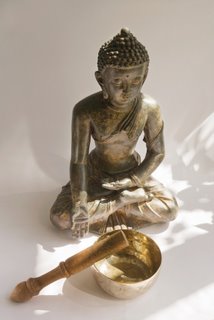 Carved Wooden Thai Buddha with Singing Bowl Music can move us to tears, help us feel calm or comforted, or inspire us to action. The rhythmic sounds of nature (think of waves breaking on a beach) can bring us into balance. Now researchers are learning more about how music and sound directly affect the healing process.
EVIDENCE. A 2008 study at the University of Maryland School of Medicine revealed that listening to music you consider joyful for 30 minutes helps release endorphins to relieve pain and reduce stress, which can otherwise overload your immune system and lead to a host of health conditions. Another study completed last year at Seattle University in Washington showed that listening to Mozart for 12 minutes three times a week can lower systolic blood pressure by seven points.
YOUR BODY TUNES IN. Researchers say that when you listen to music and sounds, your heartbeat, breath, and brain waves begin to slow down or speed up in response to what you’re hearing. Your body syncs up with the sound, and the result can be an enhanced relaxation response—stress lifts, your heartbeat slows, muscles relax, and your body releases feel-good endorphins—or improved energy levels, depending on the rhythm.
GET STARTED. Try these ways to benefit from sound therapy:
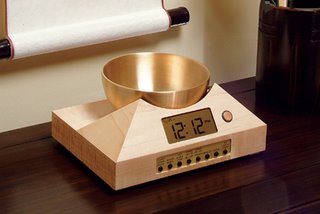 Zen Timepiece, a brass singing bowl alarm clock clock and timer for sound healing EASE STRESS:
Use tuning forks and singing bowls or The Zen Timepiece with Gong
“Sonic tools” like tuning forks and singing bowls can soothe an overexcited nervous system, says Jonathan Goldman, author of The Seven Secrets of Sound Healing (Hay House, 2008). Singing bowls create a calming noise when you run a mallet around the rim, and tuning forks hum when tapped.
Try it: Use these tools as frequently as needed, says Goldman. For tuning forks, go to Healing Sounds or Biosonics. For crystal singing bowls, visit Crystal Tones. For Tibetan singing bowls, try Now & Zen, Inc. in Boulder, CO. Get the Zen Timepiece with Brass Singing Bowl for use as an ideal Alarm Clock to wake you gentlly and progressively in the morning.
RELIEVE INSOMNIA:
“Music is to the nervous system what nutrients are to the body,” says Joshua Leeds, author of The Power of Sound (Healing Arts Press, 2001). He designs audio CDs with music, special effects, and sounds from the natural world to enhance various activities, such as falling asleep.
Try it: See Sound Remedies or Steven Halpern Inner Peace Music.
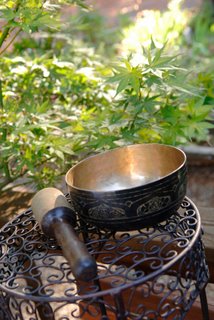 Tibetan Singing Bowls are used as acoustic instruments in Zen Alarm Clocks Listen to a healing CD
Try it: Set your acoustic Zen Alarm Clock before falling asleep so that you can wake up to the gentle chime in the morning.
SHARPEN YOUR MIND:
Learn an instrument
Studies show that daily practice of a musical instrument can keep the brain young and pliable. It can also help relieve tension as your body actually resonates with the soft energies of the instrument.
Try it: Find a local teacher and ask about beginner lessons. Practicing for five minutes can clear tension and a foggy mind.
adapted from Natural Solutions Magazine
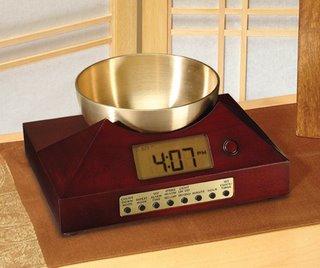 Tibetan Bowl Alarm Clock for a Gentle Awakening in the Morning
Now & Zen’s Singing Bowl
Alarm Clock Store
1638 Pearl Street
Boulder, CO 80302
(800) 779-6383
Posted in sleep, wake up alarm clock
« Previous Entries
Next Page »
|
|
|
|